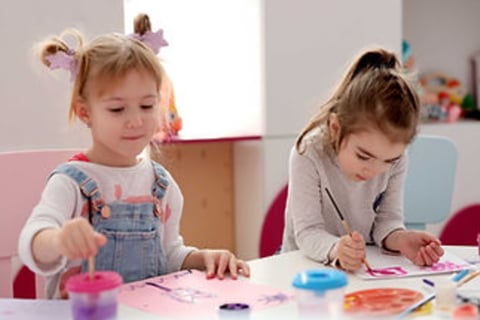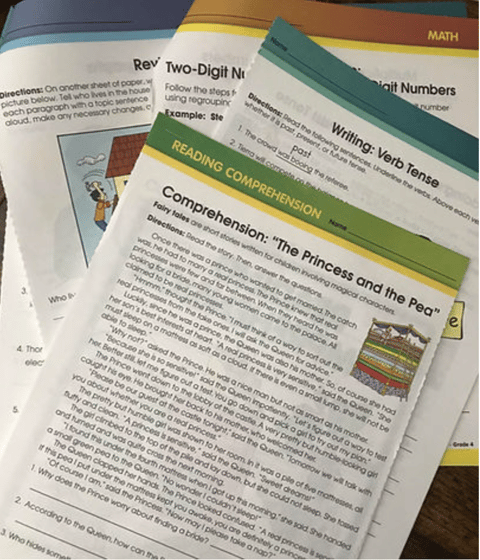The Truth About Summer Slide
Melanie Green
5/28/2022


The term "summer slide" has been around for quite a while now. It's been shoved in parents' faces even more since the pandemic. As a parent, you're probably thinking, "It's summer! They need a break! Chill out already!" If you're a teacher you are coming from the best place possible in caring so much for your students you don't want their hard work, and yours, to waste away in the summer sun. I'm here to tell you, you're both right.
I could write a book from all the knowledge and experience I have gained being behind both lines. One line being in education for 15 years and seeing what truly goes on behind the scenes in a school. I have been behind the other line for a year now, a remote working stay-at-home mom living with the frustrations of being a parent on the other side. I've seen it from both sides. I've heard it, felt it, and dealt with it. I'm going to use my knowledge and experience to tell you it is possible to combat summer slide while at the same time giving your kiddos a much-needed break.
First off, let me address both sides.
Parents, 99% of the time your child's teachers are coming from a place of care and love. Teachers love, yes love, their students and would do anything for them. It breaks my heart to say they would quite literally take a bullet for them. Why is it so hard to believe them when they are urging you to keep academics alive during the summer that it is purely for the benefit of your child? It's not to place a burden on you or to tell you in any way your child doesn't deserve some relaxation. I think in a technology-filled world where the written text has taken over, it's hard to misinterpret things. I also think we live in a world of criticism and negativity which more often than not is the easy way of thinking. I'm bad about it too! We oftentimes see the worst when really all that's there on the other side is a kind smile and good intentions. Your teachers want the best for your kiddo, just like you!
Teachers, it's your turn. Communication goes both ways. I've been in the seat of the parent-only role this last year and communication is key. As teachers we expect our students to talk to us. When we're in a small group or conferring one-on-one we expect them to communicate effectively. Parents want the same from you. Their kids are in your hands for eight hours a day, 5 days a week, 9-10 months out of the year. Once their babies go to school, they're giving up knowing what goes on in their day-to-day lives. It's like I tell my own kids, "I don't know unless I ask." Trust me, I get how hectic and chaotic the day-to-day is in a classroom but what I will tell you is this. Make a weekly newsletter one of your top priorities.
A weekly newsletter is the absolute easiest way to make parents feel like they are in the loop and they will appreciate it SO much. I know you're busy, so don't overcomplicate it! Google Drive is your friend. If your school provides an email program, just use a template in a google doc! All you have to do is update it on a weekly basis, copy and paste it into your email program and you're done! One year my team decided to hop on the Harry Potter bandwagon and I used a Harry Potter-themed newsletter through Google Slides. It was super easy and every week on Friday the three of us would meet super quick in my room after school to update it or they would send their update via email or on a sticky note. Meeting together was our favorite because it gave us a chance to catch up and compare notes on students or make phone calls to parents as a team. I've had quite a few people ask about my templates. Make sure you subscribe on the home page and be on the lookout for when those are posted!
Parents just want to know. If you communicate with them consistently it will not leave them guessing and wondering. It's like the meme of what your mom thinks when you don't answer her call and she thinks you're lying in a ditch somewhere! Parents tend to think the worst out of pure worry and concern for their kids. It's just our nature. Get ahead of the worry and concern and just communicate.
On To The Summer Slide...
I will tell you that "summer slide" is no joke. It's no myth. It's not a tall tale. It's 100% real. Every year when students come back teachers know the whole first month of school is going to be spent reminding students about expectations (rules and how to behave like a kind, polite human being) and reviewing everything they were taught the year prior. I'm not kidding. The same expectations have to be revisited in January because manners and behavior are so poor, but that's for a totally different post. Anyways, I used to get frustrated because I felt like so much time was wasted on reminding kids how they should act and what they learned last year. I think a review is always a good thing, but I'm not talking about a quick review. I'm talking about a thorough assessment of where students are academically and trying to conduct a comprehensive review to get them up to speed.
If even the smallest effort was made during the summer, I don't think it would be near as bad. Okay parents, don't freak out! I'm going to fill you in on some super easy activities your kiddo could be doing over the summer that will help to combat summer memory loss.
#1. No Matter The Age, Grade, or Level...READ!!!
Say it with me...
Reading is fun,
Reading is good,
If I stop reading
I won't be where I should.
No matter what grade your kiddo is in, if they read just 15-20 minutes at least 5 days a week it will help tremendously!!!!!! Do you see all the exclamation points I just put at the end of that sentence?! If you want to practice comprehension you can ask questions like these:
Who are the characters in your story? What are some character traits to describe them?
What is the problem in your story?
Once they are finished with the story have them make a 'story mountain' or a 'story arc' where they plot the exposition, rising action, climax, falling action, and the resolution.
If reading non-fiction as them what text features are in their book and what the purpose of each one is. (Text features are captions, illustrations, text boxes, charts, photos, etc.)
What is a theme represented in your book?
Ask your kiddo to give you a summary of the chapter they read and then make a prediction of what will happen next.
If they're artistic have them draw a scene from what they've read and explain to you what is happening.
The possibilities are endless! I would stick with open-ended questions which means don't ask them questions that result in yes or no answers. To gauge their comprehension (understanding) of the text, they need to explain. Reading is super important because guess what they have to do in every single subject in school? READ. It will help with word problems in math, understanding directions to a science experiment, how to write better, and get their thoughts on paper, and it will help reading all about our history.
#2. Find A Simple Work Book
Find a workbook that addresses all core learning. My wonderful mother found the perfect one for my daughter going into 4th grade next year. This year was so rough for her. She was already behind because of the pandemic and then a week after school started she was sent home sick, tested positive for stupid covid, and 3 days later fell from our kitchen table having a seizure and hit her head on the floor. She was out for 3-4 weeks. Then was in and out of appointments and tests through January! The worst part is I know without a doubt others have had an even worse year than her! It's more important now than ever to keep her brain working and to prevent summer slide.
The workbook has a reading comprehension, English, Writing, and Math section. This thing is big, I'm talking almost 500 pages. The picture below shows what the worksheets look like so you get an idea.
When I first told showed my daughter the book and told her she was going to be working on it this summer she started to cry! So what I did was rip out every single page. I separated them by subject, and then I started assembling a few pages from each section to staple together. Once I explained to her she was only going to do a packet every few days she was fine with it.
To make it even more fun I got a jar and some pretty pebble stones. For every page she successfully completes (by successfully complete I mean me checking it and us correcting any wrong problems together) she will add a pebble to the jar. The jar is marked with a line close to the top. Once she reaches that line, she has reached her goal and will get a reward. I would suggest sitting with your kiddo to talk about goals and why they are important. Life learning opportunity The end goal/reward should be something special. A trip somewhere, a special night, etc. You could make smaller goals along the way. A smaller reward could be ice cream or cookies, their choice on game or movie night, a trip to the treasure box filled with Dollar Twenty-Five Cent Tree (see what I did there? LOL) goodies, etc. If you're having a hard time getting them to sit down and work on it, check out the next step.
#3. Create A Structured Routine/Schedule
Any teacher will tell you structure is super important. If you're thinking drill sergeant and lots of crying, you've got it all wrong. Structure doesn't have to be cold and rigid. It just needs to be a routine to follow in order to be productive.
Kids need breaks just like adults do. I don't want you to think this schedule has to be back-to-back work or that you have to follow this schedule down to the minute. Make a goal for 2 pages in the morning, 2 mid-day, 2 late afternoon, etc. Everyone's schedules are different so fit this in according to how your family works. For the younger ones, I would suggest something fun follow the work so it will give them some motivation.
Something else I would suggest is posting your expectations somewhere. Use a calendar board, a corkboard, heck just write it on a piece of paper and put it on the fridge! Seeing it every day will help hold accountability.
My high schooler set his own summer schedule without me saying a word. I literally wanted to drop to my knees and yell "Thank you Jesus he listened!" up to the heavens! My 8th grader will obviously have a more rigorous schedule than my 4th grader. Get your kids involved in their own schedule. It'll hold them accountable and ultimately sets them up for success. The key is to stay consistent in expectations. My 8th grader started his schedule on his own accord as well. He's already told me he wants to run and workout on a regular basis this summer. It may not be academic but making goals has seeped into his brain because he wouldn't be making that type of statement if it hadn't! He's a football player and wants to get better over time. If you have an athlete, they can have "summer slide" as well. Keep them active both mentally and physically!
#4. Find Teachable Moments When You Can!
We get so caught up in life that sometimes we forget it's the simple things that can make the biggest impact. Encourage your kiddos to ask questions. Use everyday tasks to teach your kids! Have to go to the bank? Ask your kiddo if they know why people go to banks! It's a good opportunity to teach a life skill that leads to a math lesson. Go home and count their piggy bank together or have them go around the house to find loose change and count it together.
This lesson might require more patience, but have your kiddo help cooking one night! My kids take turns picking a meal each week and whatever they pick they have to help cook. Most often I do the meal planning and then they will choose what meal to help with. Help teach them to read the recipe and follow directions.
Following directions is HUGE. Teach them not only how to follow directions, but why it's important to follow directions. Your kid's teacher will thank you! Cooking with your kiddo is also a good time to actually have a conversation with them too. On the academic side, this helps their reading skills, problem-solving, math skills, and more. Try to let them figure things out and solve problems if they arise. The reason you should let them make mistakes is it teaches them about failure and how to move on. The bottom line is they are learning on so many levels doing something so simple. Don't overcomplicate! This could be something as simple as scrambled eggs and toast or mac and cheese!
#5. Take Them On Field Trip
Another way to prevent summer slide is to take your kids on field trips! Going on a big vacation? Great! Teach them how to find a hotel online, how to use google maps for directions, how to budget for food on the trip, etc. Teach them about safety and why you do things a certain way.
Staying at home this summer? Go to that forgotten about building that houses thousands of books! You know, the public library! No matter the age, this is a great learning experience. You can tie this into anything.
For the younger kiddos contact your local police station or fire station and inquire about tours for kids. What kid wouldn't want to climb around on a fire truck or meet a police officer in real life? My kids loved going to the fire stations and the firemen loved it just as much!
Too hot to go anywhere? Are gas prices too high? (We know the answer to that already) Sick with covid? No worries! Your kiddo can have a virtual field trip! The possibilities are endless with a virtual field trip. Just google 'virtual field trip' or 'virtual field trip for kids and you will find so many options. You can see a zoo in real-time, learn about a foreign culture by visiting google earth, learn about the ocean by live-feed on a boat, etc. There are some really cool things your kids can be exposed to through technology.
I'd advise you to check out specific sites first before telling your kid to go google.
If you put effort into any of these options you will be helping to prevent summer slide and it will ultimately benefit your kiddo tremendously! Parents, on your part it takes some effort. If you need help with ideas, materials on a budget, time management, or anything, just let me know! You can get in touch with me in multiple ways. Use the contact page on my website or you can connect with me on social media by clicking the links at the bottom of the page.












